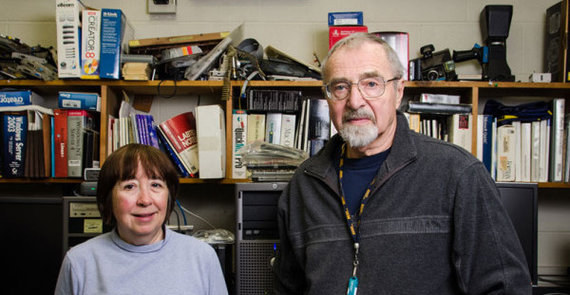25 Faces 25 Years: Maryann Fitzpatrick and Wolfgang Nadler
By Mary Caparosa ’16
Photo by Andrew Pellegrino ’18

Instrumentation Specialists, Drexel University College of Arts and Sciences
January 17, 2017
“It was very rapid, the adoption of the computer here at Drexel, and the use of it,” Wolfgang Nadler says. He gestures to a wall above his desk that he calls the “nostalgia wall.” It’s a visual encyclopedia of how information has been shared. There are at least a dozen pieces of technology. He begins to explain the pieces, how they progressed into what we have today.
When he gets to the first personal Apple computers, he pauses. “You like stories?” he asks. “This is a good one.”
Maryann Fitzpatrick continues his thought: “We had the very first stolen Mac at Drexel,” she says with a laugh.
It’s amazing how in sync the two are, but working together for 32 years will do that.
“When we went next door, there were footprints all over the wall.”
Fitzpatrick and Nadler design and build many of the instruments that students, professors and professionals use in their research at Drexel. If something has never been done before, you can bet that Fitzpatrick and Nadler will try to do it.
Back in the 1980s, the pair had a hand in choosing and developing the computer network for the College (then the College of Sciences). When Apple and IBM presented on campus, the University had to decide which company’s products to use. Eventually, Drexel chose Apple, and Fitzpatrick and Nadler were given one of the University’s first Apple computers.
Naturally, they were fascinated by it. The first night, Nadler took it home to show his kids. The night after, Fitzpatrick got a turn to show her family. The next day, she brought it back and locked the office before heading out to another building.
“By the time I got back, it was gone,” Fitzpatrick recalls. “Wolf thought I didn’t bring it from home.”
“I asked her where it was,” Nadler interjects. “And she said, ‘It’s here!’ and I said, ‘No, it isn’t!’” he says with a laugh, shaking his head.
“Someone had stolen the key from another room and managed to climb over into our office,” Fitzpatrick says. “They took the computer and a few other instruments. When we went next door, there were footprints all over the wall.”
“First Mac ever stolen at Drexel,” Nadler jokes.
It wasn’t his only notable first with these computers: “I was the first person to hack a Mac at Drexel — not software-wise, but electrically,” he says proudly.
At the time, there were no overhead projectors like those we know today, so Mac computers weren’t able to project onto screens. The inventive Nadler designed a video board to connect to large televisions in the classrooms.
“That’s the ideal situation: Someone has a project and they need an instrument for it, so we get involved,” he says.
“And then we build it!” Fitzpatrick finishes.
The two of them have seen many diverse projects. “That’s the beauty of this job. That’s why we’re still here,” Nadler emphasizes.
“It’s never boring,” adds Fitzpatrick.
“You always rub elbows with people who are smarter than you,” says Nadler. “Everyone treats you as a colleague. It’s a nice environment to work in. It’s very stimulating.”
“And you never know if you can do what it is they’re asking,” Fitzpatrick says. “It’s challenging, but fun.”
At the root of their jobs, Nadler and Fitzpatrick are problem solvers, innovators and creators. They are the realists. They take ideas of great scientists, from the simple to the far-fetched, and turn them into tangible items. If you’re ever in need of a good story, head over to their office in Disque Hall. Sit down among the stacks of history. Nadler makes a mean cappuccino, and their passion and excitement are infectious. Make yourself at home with the facilitators of technological change at Drexel. You’ll leave inspired, knowing that anything can be done — you just need the right tools.
This article originally appeared in the College of Arts and Sciences' Ask magazine feature story, "25 Faces, 25 Years." For more Ask stories, visit askmagazine.org.